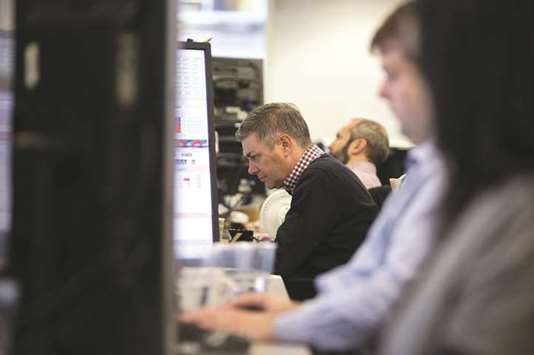Global stocks sank yesterday after US President Donald Trump said he was not satisfied with talks aimed at averting a trade war with China.
Equities were also dented by poor eurozone economic data, and as doubts persisted on a planned summit between Trump and North Korean leader Kim Jong-un.
“US stocks are adding to yesterday’s (Tuesday) decline amid flared-up global uneasiness as trade relations with China are being called into question, while a highly-anticipated summit between North Korea and the US appears in jeopardy,” Charles Schwab analysts wrote.
Across Europe, London’s FTSE 100 fell 1.1 % to close at 7,788.55; Milan’s FTSE MIB was down 1.3% at 22,919.52; Paris’ CAC 40 fell 1.3 % at 5,565.85, while Frankfurt’s DAX 30 plunged 1.5% at 12,976.84. The EURO STOXX 50 lost 1.3% at 3,541.38.
Markets had surged on Monday after US Treasury Secretary Steven Mnuchin and Chinese Vice Premier Liu He said they had agreed to pull back from imposing threatened tariffs on billions of dollars of goods and continue talks on a variety of trade issues.
However, Trump has declared that he was “not satisfied” with the status of the talks, fuelling worries that the world’s top two economies could still slug out an economically painful trade war.
And in a fresh sign that the trade war threat has yet to dissipate, India opened a World Trade Organization challenge against the US’ steel and aluminium tariffs, as it accused Washington of “multiple violations” of WTO rules.
With Trump warning that there was “a very substantial chance it won’t work out” when asked about next month’s landmark talks with Kim, US Secretary of State Mike Pompeo yesterday threw the ball back into the North Korean leader’s court.
Asked in a hearing of the House Foreign Affairs Committee if the summit, tentatively planned for Singapore on June 12, will take place, Pompeo replied: “That decision will ultimately be up to Chairman Kim.”
On the currency front, while the US dollar rallied, the euro, the pound and the embattled Turkish lira all tumbled, with political turbulence in Italy triggering a huge sell-off of assets there, according to Fawad Razaqzada of Forex.com.
According to Charles Schwab analysts: “Italian political uneasiness is also prevailing as the markets grapple with the populist coalition government’s choice for prime minister and potential fiscal implications of its policy proposals.”
Adding to nerves, a key survey showed yesterday that the pace of growth of eurozone business activity continued to slow in May, as companies became less optimistic about the state of the economy in Europe.
Data monitoring company IHS Markit also flagged strong slowdowns in France and Germany, though employment growth in the 19-country single currency bloc remained robust.
The purchasing managers’ index (PMI) by IHS Markit fell to 54.1 in May, which was lower than forecast by analysts.
A figure over 50 indicates the economy is expanding.

Traders study information on trading screens at ETX Capital in central London (file). The FTSE 100 fell 1.1 % to close at 7,788.55 yesterday.
